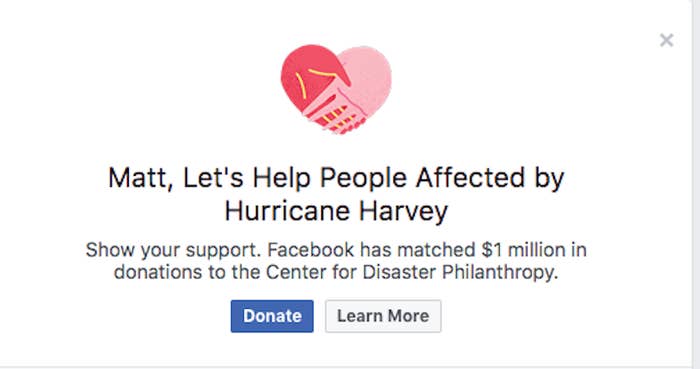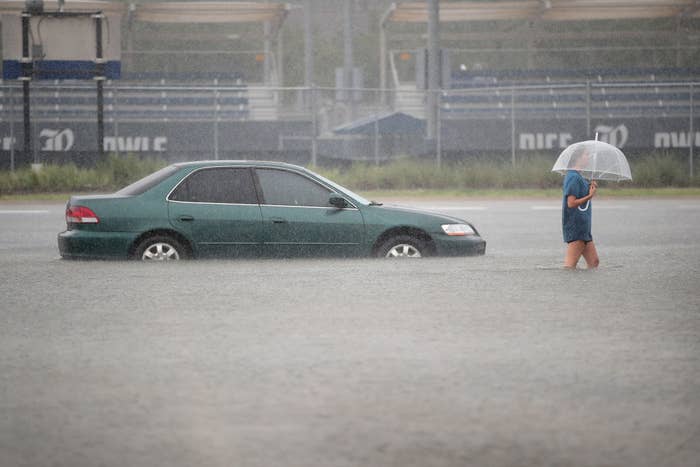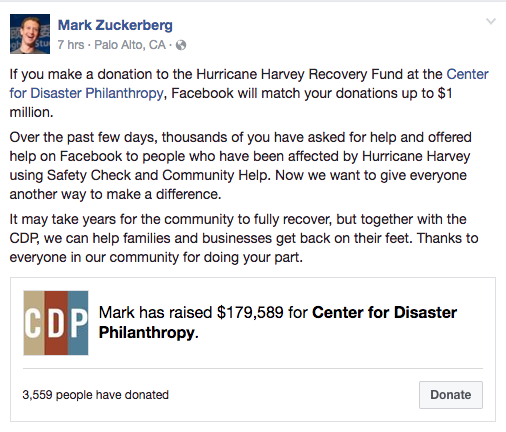
Facebook is steering donations for Hurricane Harvey relief to a tiny, little-known charity called the Center for Disaster Philanthropy — and bypassing the Red Cross, its longtime partner in the midst of disasters.
During Typhoon Haiyan in 2013 and the Ebola outbreak of 2015, a button on Facebook News Feeds prompted users to send money to the Red Cross. And as floodwaters have inundated Houston, Donald Trump and Barack Obama have both publicly donated to the Red Cross, as have dozens of major corporations.
Now, Facebook is routing its millions of users, and $1 million of its own money, to the Center for Disaster Philanthropy, which in 2015 had just $3 million in revenue. A message on Facebook feeds with a donate button said, "Show your support. Facebook has matched $1 million in donations to the Center for Disaster Philanthropy."
Bob Ottenhoff, the CDP’s president and former CEO of GuideStar, a clearinghouse for information on nonprofits, said the group works to change how donors think about giving during disasters, focusing on long-term recovery. “People are motivated right now, because they’re watching television and reading newspapers,” said Ottenhoff. “But we find there’s a dramatic reduction in contributions almost immediately once the media attention is over. In a case like this, with what we see happening in Houston, it’s going to be a very long recovery.”
Facebook’s shift is a potential sign of the growing discontent with the Red Cross and other rapid-response groups’ activities in the wake of natural disasters — as well as attempts by Silicon Valley to rethink how people give money to charity, steering donations to causes tech magnates think will be the most effective.
The Red Cross has faced intense scrutiny and criticism for its work in previous disasters. During Hurricane Harvey, people have encouraged others on social media to donate to groups other than the Red Cross.
Facebook’s unusual Harvey partnership sent so many users to the CDP that the organization’s website quickly crashed. The CDP’s Facebook page was inundated with comments from people who had never heard of it, demanding to know where their money was going and even worrying that the call for donations was a “scam.”
“I donated $50 and instantly freaked out,” commented one user, Jenna Workman Travers. “I called my bank and they think it’s okay, because it hasn’t come up yet as a scam. But, I cancelled the donation because it suddenly seemed shady.”
The CDP had reached Facebook’s $1 million matching goal in less than four hours, said Ottenhoff — by far its biggest fundraising push.
“We believe the Center for Disaster Philanthropy is well positioned to help meet the recovery needs of communities in Texas,” a Facebook spokeswoman said. “CDP knows from past disasters, especially through their experiences with hurricanes and floods, that full recovery will take many years.”
Facebook still partners with the Red Cross, the spokeswoman said, by allowing the group to raise money through its own page.

Silicon Valley has been at the forefront of rethinking how philanthropy works — with an eye, tech barons say, toward maximizing well-being with each dollar spent.
Tech figures have been major funders of GiveDirectly, a nonprofit that makes direct, unconditional cash grants to individuals living in poverty. Facebook cofounder Dustin Moskovitz’s wife, Cari Tuna, is the president of the Open Philanthropy Project, which does extensive research to identify “high-impact” charity projects. GiveWell, a charity evaluation service connected with the Open Philanthropy Project, cautions potential donors to “support an organization that will help or get out of the way.”
The investigative journalism outlet ProPublica exposed a series of catastrophic failures at the Red Cross, including a “secret disaster” of mismanagement in the wake of superstorm Sandy and Hurricane Isaac and a massive influx of donations squandered in the wake of the 2010 earthquake in Haiti. One particularly blistering headline from a 2015 story: “The Red Cross Raised Half a Billion Dollars for Haiti and Built Six Homes.”
Last year was the Red Cross’s worst fundraising year since 2000, ProPublica reported. In a statement, the Red Cross said it still had an “established and ongoing” relationship with Facebook, which allowed it to raise money through a disaster fundraisers platform.
Unlike the Red Cross, which provides on-site aid, the Center for Disaster Philanthropy does not itself provide any services. Instead, it collects money and uses an advisory committee to disburse funds to smaller groups, many of them local — filling in gaps left by government organizations and large national charities.
“To have Facebook say ‘this is where we think our money should go and we welcome others to join us’ is a major tipping point in learning about recovery,” Debra Jacobs, the chief executive officer of the Patterson Foundation, told BuzzFeed News. The Sarasota-based charity announced Tuesday that it was donating $250,000 to the CDP’s Hurricane Harvey fund; it had also given money to the group in the wake of other disasters.


